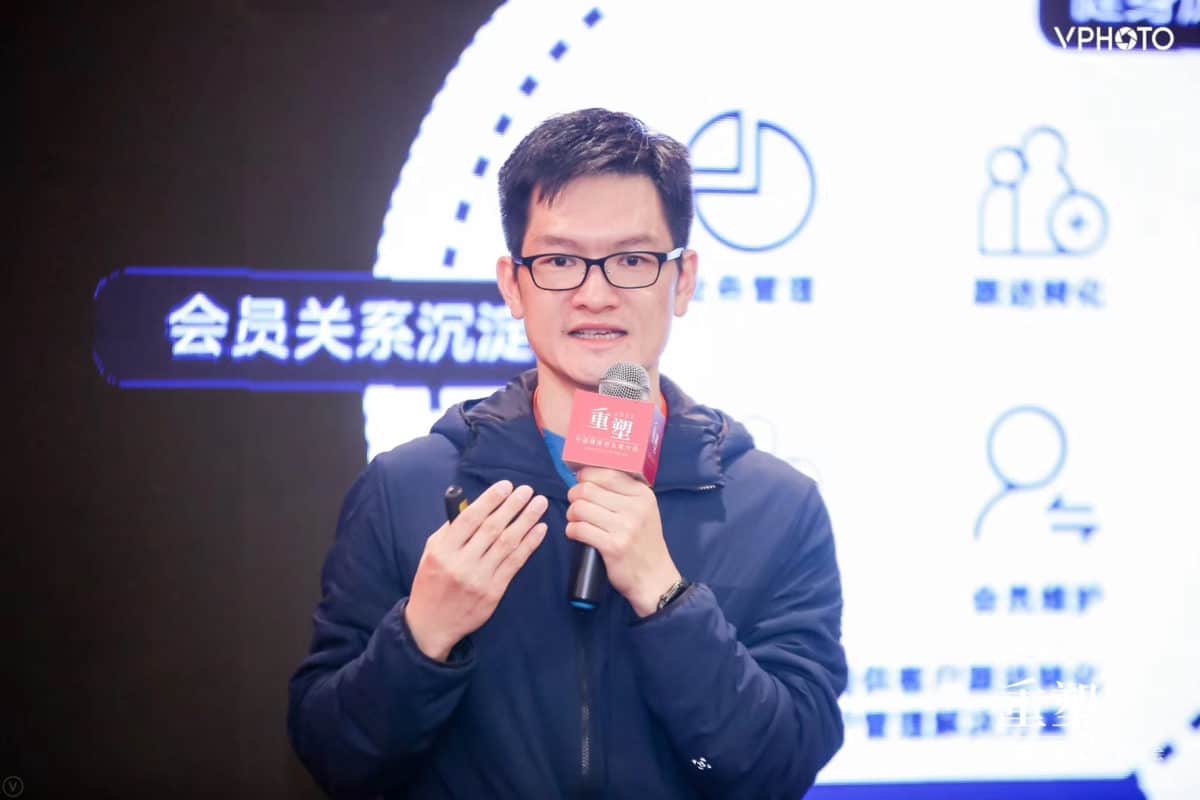WeChat provides a unique environment for many SaaS systems to thrive. (WalktheChat is one of them). During the last WeChat Open Class conference in Guangzhou, two SaaS companies really stood out…
Qingcheng Tech
Around 2 years ago, I noticed most gyms I know around Beijing started to use the same system to handle member signup on WeChat.
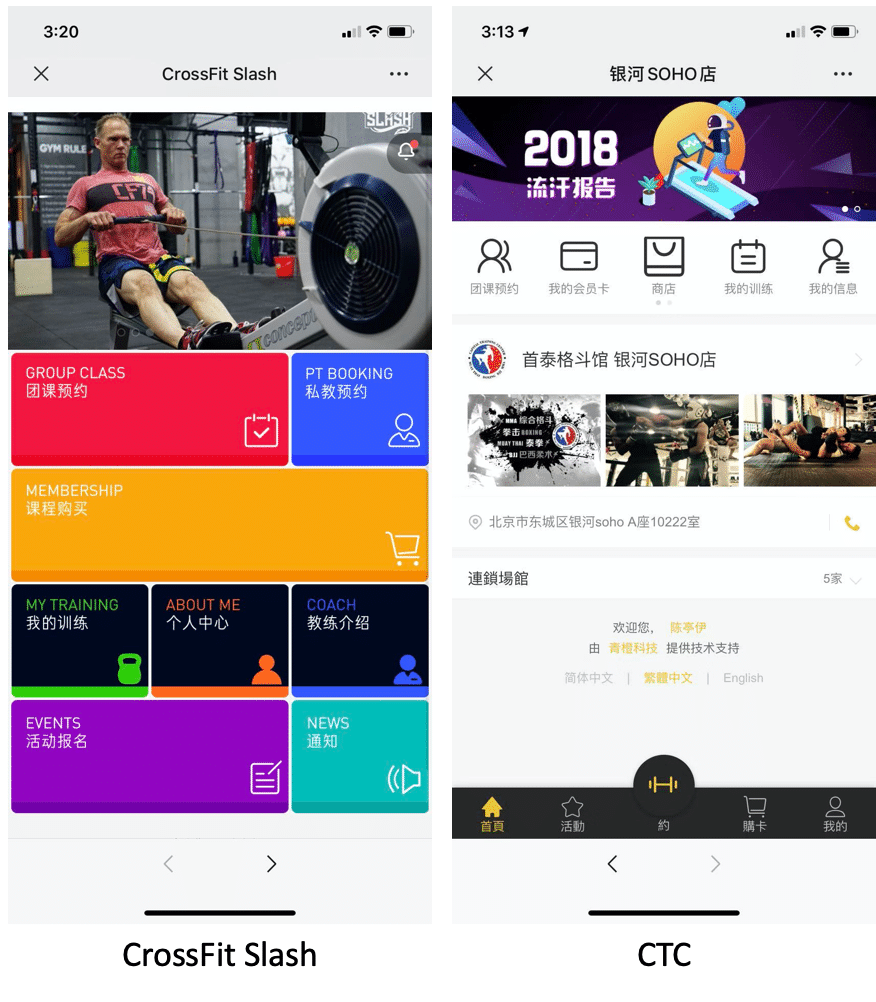
The system is called Qingcheng Tech. It’s a startup founded in 2014, and today, it’s being used by over 30,000 gyms across China. The yearly fee for Qingcheng tech is around 3,000 RMB.
I was lucky to bump into the Kent, CEO, and founder of Qingcheng Tech, during the WeChat Open Class. Kent openly shared how he was able to make a B2B SaaS product viral.
Interview between Kent (CEO of Qingcheng Tech) and Jenny Chen (co-founder of WalktheChat)
WalktheChat (W): The sales cycle of SaaS products is usually long, it takes months to convert a client. How were you able to take such a big market share in such a short time frame?
Kent: We started selling our platform the traditional way: trying to convince the boss of gyms to adopt our system. If you go to a fitness conference, you can meet with 50 bosses, and eventually, maybe you can convince 5 of them to buy your system.
Then we realized that the people who would spend the most time using our system are actually the coaches, not the gym owner. So we decided to change our strategy and started targeting coaches. We provide a class signup tool for the coaches to share with members who take private classes. Members can clearly see when the coach is available, and they are able to book or cancel the classes accordingly. We made this P2P tool free to use. Quickly, it went viral among coaches.
If 2 coaches from the same gym would like to synchronize their schedule, they then will need to upload the business license of the gym to create a company account.
Usually, the owner/manager is the last person to hear about our platform. By the time they heard about us, most of the coaches are already using our system, and this will then push the owner to adopt our system if they’d like to be able to manage members and see the overall data.
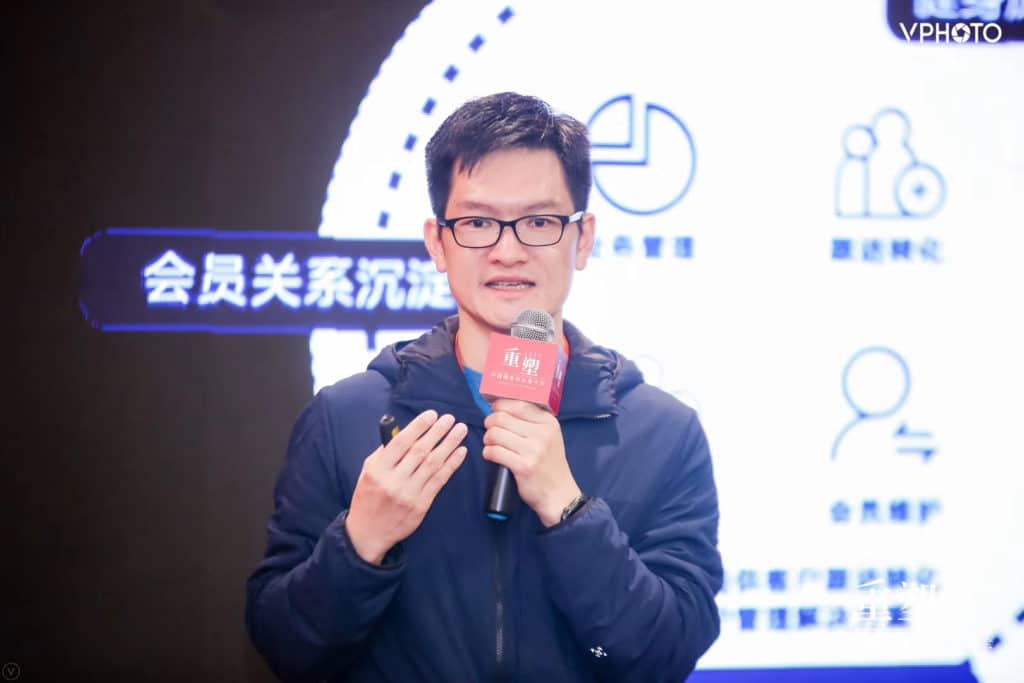
W: How about competitors? How did you stand out from them?
Kent: Yes, we have many competitors, and they would copy any new features we launched. In order to retain clients, we started to look into the needs of the gym. In general, a gym has 2 needs.
A gym first needs many resources to start its operations: finding a good location, purchasing of equipment, finding coaches, and providing on-going training classes for the coaches. Qingcheng added modules to fulfill these needs accordingly. We are even going to integrate with Lianjia to provide a rental listing.
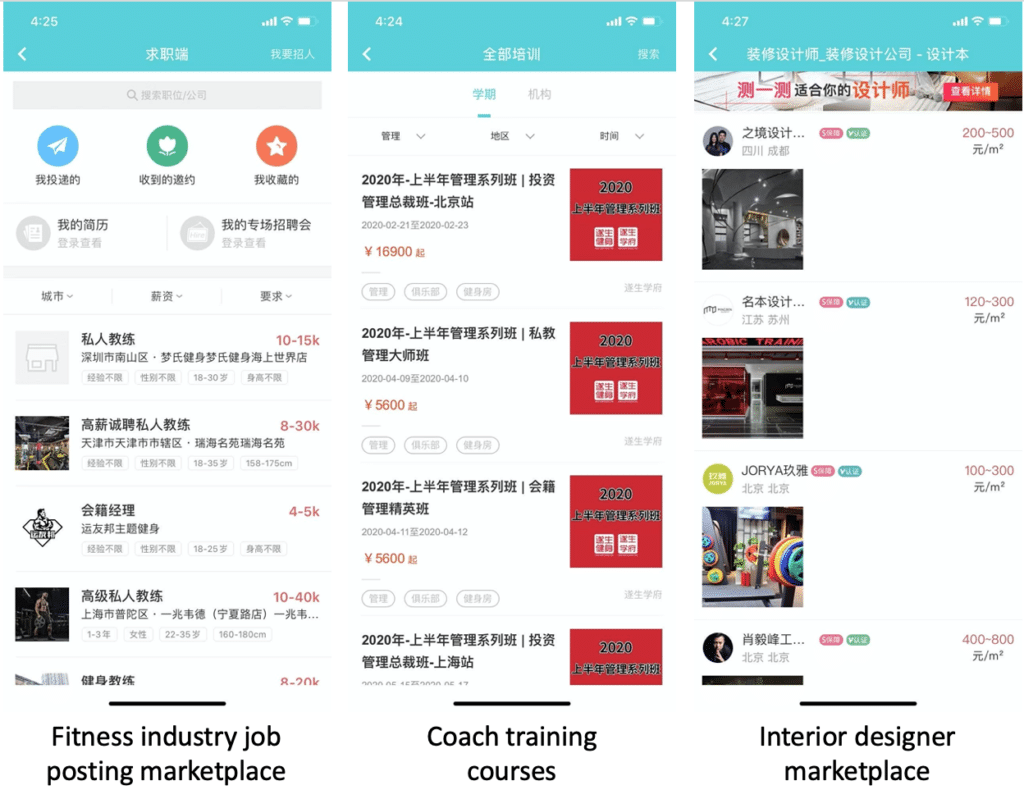
We also realized most of the sourcing needs are a one-time demand. The gym’s biggest long-term need is to recruit more clients. And Qingcheng Tech solves this issue by integration with large B2C platforms.
Dianping is the largest user acquisition channel that Qingcheng leverages. Qingcheng Tech synchronized with Dianping so that:
- The gyms can list themselves on Dianping through Qingcheng’s backend
- The class schedule will automatically be synchronized with Dianping
- Dianping will give Qingcheng a sales commission if members signup via the platform
Qingcheng also just launched on the WeChat Work App Platform. This enables companies to compensate for employees’ fitness expenses.
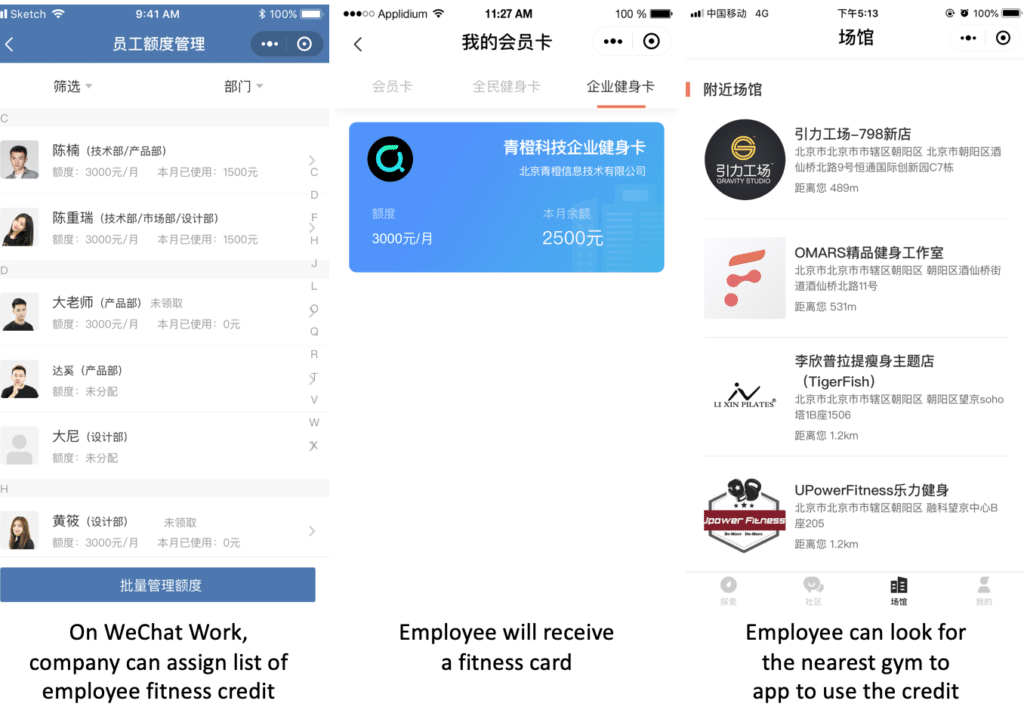
Within WeChat work, users can add 3rd party built Apps.
For example, if a company wants to reward employees with 1,000 RMB worth of fitness credit every month, they can do so with WeChat Work.
The employees can use our system to look for a list of gyms on WeChat Work, and then they can select the gyms they want to join and pay for the specific class with the company credit. If the credit can not cover the full fee, then the employee can just pay for the difference.
This way members can use our system to discover new gyms. For any transaction happening via the WeChat Work plugin, we get a 10% commission.
We also have the same system on Alibaba’s Dingding and Bytedance’s Lark. Bytedance is using Lark integration for its employees’ fitness reimbursement.
W: Which system do you think to have more potential? WeChat Work or Dingding?
Kent: WeChat Work. Dingding has the ability to bring traffic to the gyms. But it does not have the ability to manage the member groups. Because the gym members do not use Dingding.
W: Do you integrate with the gyms’ existing systems?
Kent: No, we convince the gyms to abandon their old systems (if there is any), and use our system. That’s why some very large gyms are still using their old management system, while all their coaches have already adopted Qingcheng.
W: Do you provide operation and sales services?
Kent: No, we are mainly a product company.
WTC conclusion
Qingcheng tech was able to experience explosive growth by changing the product to target their end-users: the coaches. They successfully focused on the demand market to incentivize enterprises to use their product. And they were later able to differentiate from competitors by integrating with suppliers (schools, equipment, rental platforms), and client acquisition platforms (Dianping, WeChat Work, Lark, Dingding).
Qingcheng completely replaced the old gym management system. One of the reasons for their success is that the gym industry in China is a new and booming industry. Most of the gyms were only founded in the past 3 years which makes it easier for them to adopt a new system.
Zhiketong — a SaaS company with crazy high ROI on WeChat ads
I didn’t believe in WeChat Moment ads for high-value e-commerce until I met Jeremy (Yijing) Yang, the General Manager of the Digital Marketing Department of Zhiketong.

Zhiketong is a WeChat Direct-sale Digital Marketing agency for hotels, utilizing “SaaS Transaction System + Service” operation model to help hotels build WeChat H5 and Mini Program Stores.
Besides, Zhiketong provides partners with comprehensive service, including digital marketing solutions, consulting and operating service, marketing channels, advertising, comprehensive data analysis (and more) to assist partners in optimizing management efficiency, improving quality and efficiency of services and gaining brand awareness.
Founded in 2014 and backed by Sequoia, IDG Capital and other big VC firms, Zhiketong helped its partners achieve impressive growth results:
- 400 million RMB GMV during 11.11 in 2019
- 7,000 hotels participated in the 11.11 promotion
- Sold 320k room bookings during the 11.11 promotion
- 80% market share among 5-star hotels within China
- Over 100% sales ROI via WeChat Moment advertising campaigns!!!
- 800 employees. Half of the team is operation and sales marketing consultants
Service is the key to the commission-based price structure
During its first few years of operation, Zhiketong provided WeChat mini-site services for 0 fixed costs. It only charged a commission (2-6%) on sales. Zhiketong was able to cover the operating costs with investment funding.
According to Jeremy, the Chinese hotel industry is one of the most complicated industries to crack. The decision making power is spread between the hotel brand and the real estate developers. It’s also a conservative industry which makes it harder to push any changes. Hotels usually have a small marketing department meaning one person often needs to multitask.
The commission-based cost structure is necessary to convert conservative clients in the hotel industry. And it also forced Zhiketong to be result-oriented: every service needs to be sales driven. Zhiketong provides consulting, marketing, and operation services to help clients succeed. One of the most value-added services for premium clients is to help them with product design. For example, based on the positioning and location of the hotel, what should be the pricing and services the hotel can upsell.
Due to the commission structure, Zhiketong also limits its focus to only 4 and 5-star hotels. “These are the ones that would generate larger sales in rooms and meals because they have various SKUs on a property that can be included in marketing packages.”
Integration
Integration with Hotel Property Management Systems (PMS) is one of the keys to converting hotel clients. Zhiketong integrates with more than 10 PMS, which covers most of the Chinese market.
Incredible display ads conversion
Zhiketong provided display ads service that are more targeted and better optimized than the official WeChat backend.
Here is one of the case studies of Zhiketong’s ads campaign. It’s for Sheraton Beijing Lize Hotel, a new hotel in Beijing.
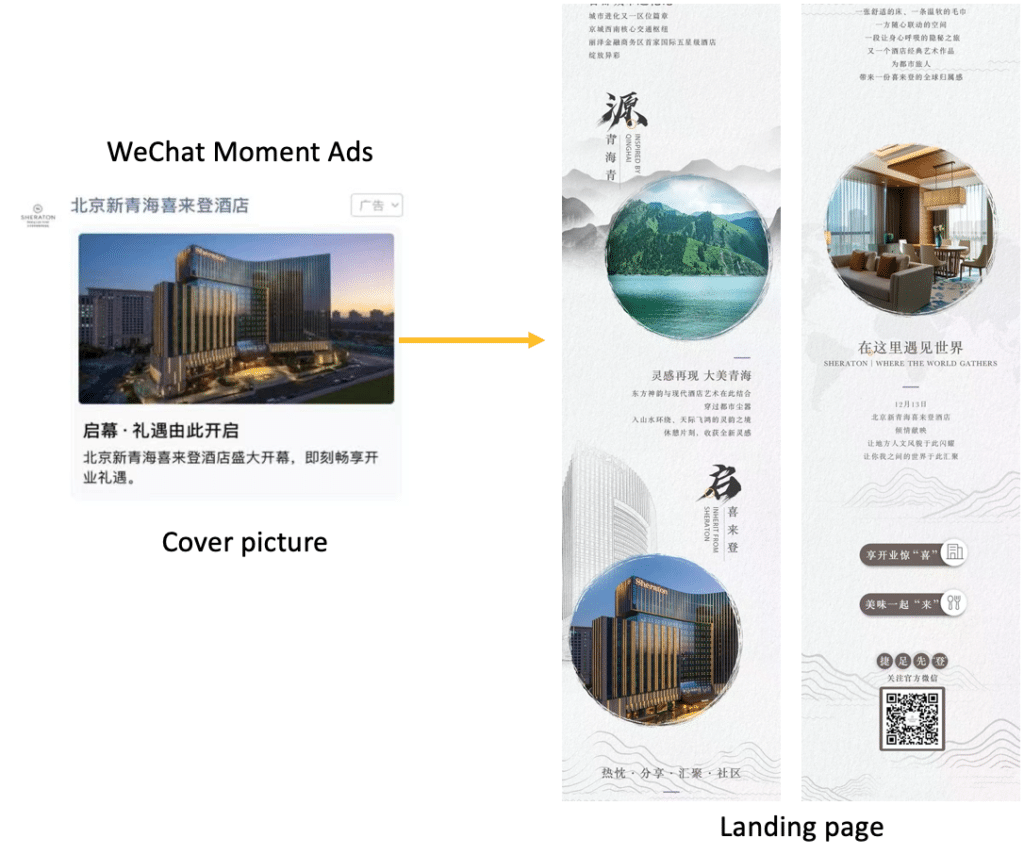
Investment: 50,000 RMB
Product:
- Family buffet 288RMB
- Single person buffet 139RMB
- Buy 5 get 5 buffet voucher 135RMB
- Buy 10 get 10 buffet voucher 129RMB
Order amount generated by the display ads: 200
New Official Account follower: 1,200+
Sales ROI: around 100% (ROI may have been higher, but products sold out in the middle of the campaign. The remaining days were pure exposure)
Ad Exposure: 500,000+
It is very difficult to generate sales results using WeChat display ads (unlike on Facebook). This is especially true for higher-priced items such as a meal in a hotel restaurant.
Facebook/Instagram ads could be sales driven since brands could use the user information they collect via the Facebook Pixel, and improve the targetting based on the performance of their ads.
According to Jeremy, Zhiketong is able to optimize the campaign results by leveraging:
- Location-based advertising (LBS) targeting users around the hotel
- Utilize Zhiketong transaction SaaS system to narrow the target audience using past purchasing data
- Zhiketong is integrated with the Tencent ads system. Ads result could be optimized based on sales conversion data (oCPM functions)
The ads itself seemed standard, one cover picture leads to the native WeChat ads landing page. There are 3 action calls at the end, taking users to the WeChat H5 store or Mini Program for room booking, meal purchase, or inviting them to follow the official account.
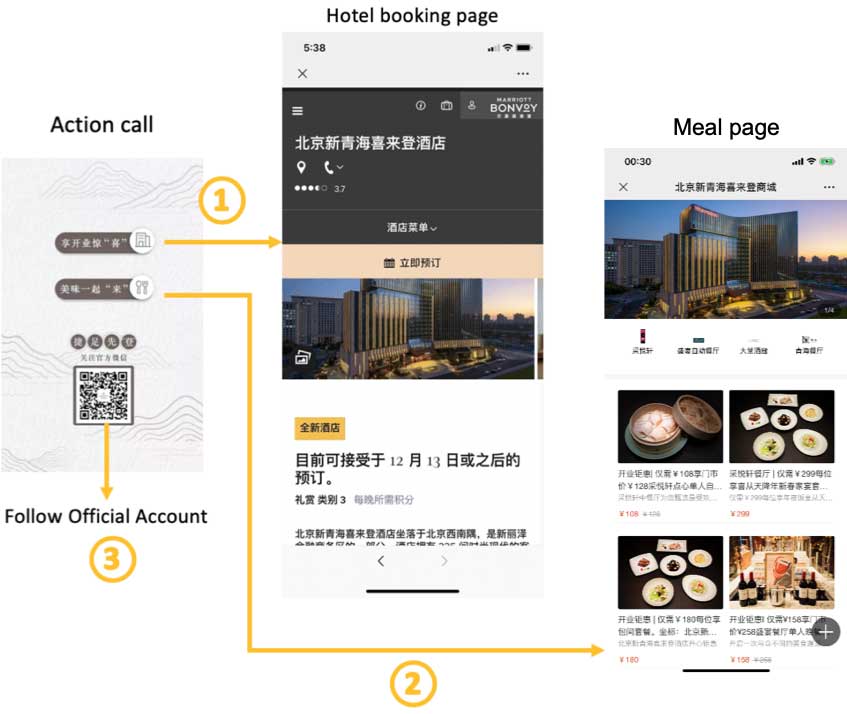
Normally campaigns work best with 1 single action call. But with 3 actions calls, the campaign was still able to achieve a positive ROI and add 1.2k followers. API integration and targeting optimization are the keys to this successful campaign.
WTC conclusion
The key to success for SaaS companies in hospitality (a complicated and traditional industry) is integration with Hotel PMS and providing sales-driven tailor-made marketing consulting services on top of the SaaS system.
System integration enables an easier adoption of the new platform, while services like consulting, ads and operation are key to client retention.
Conclusion
SaaS companies like Zhiketong and Qingcheng Tech took a very different approach to become leaders in their industry. Qingcheng was able to expand by focusing on solving the needs of coaches. Fitness is a booming industry in China, and Qingcheng was, therefore, able to completely replace the old gym management systems and focus on cross-industry integration that brings value to its clients.
Zhiketong was able to provide a freemium solution and really focused on helping clients generate sales. The hotel industry is conservative, thus Zhiketong had to integrate with most of the PMS in order to convert clients.
As Alibaba, Tencent and Bytedance are increasing their focus on B2B services, SaaS will continuously be an exciting industry to watch out for.

